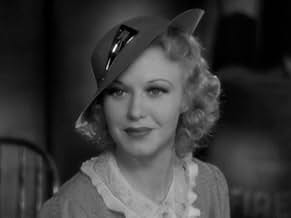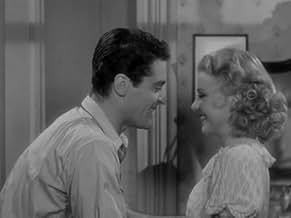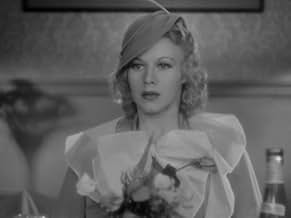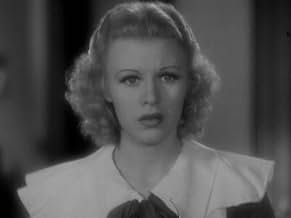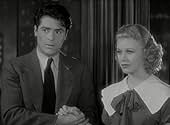CALIFICACIÓN DE IMDb
6.8/10
934
TU CALIFICACIÓN
Agrega una trama en tu idiomaRejected as an immigrant because he doesn't have the required $200, a Czech immigrant jumps ship and is befriended by a chorus girl and becomes a taxi driver.Rejected as an immigrant because he doesn't have the required $200, a Czech immigrant jumps ship and is befriended by a chorus girl and becomes a taxi driver.Rejected as an immigrant because he doesn't have the required $200, a Czech immigrant jumps ship and is befriended by a chorus girl and becomes a taxi driver.
- Dirección
- Guionistas
- Elenco
- Premios
- 2 premios ganados en total
Richard Alexander
- Man at East River
- (sin créditos)
Irving Bacon
- Counterman
- (sin créditos)
Wade Boteler
- Customs Inspector
- (sin créditos)
A.S. 'Pop' Byron
- Policeman Writing Down Charges
- (sin créditos)
Spencer Charters
- Marriage License Clerk
- (sin créditos)
Martin Cichy
- Policeman at Bar
- (sin créditos)
Opiniones destacadas
This delightful work details the struggle of a Czech illegal immigrant, Karel Novak (Francis Lederer), to remain in the United States during the Depression, with a sparkling script limning the cultural impact of New York City upon the newcomer. Stephen Roberts directs with his customary skill in one of his final films (he died shortly after at the age of 40) and avoids both the hyperbolic and hypocritical, particularly significant when we are given the insincerity which marks the current immigration debate with its rough moral equivalence. The Bohemian-born Lederer's strong performance is quite probably his best, with an excellent and witty scenario providing the cast, which includes many of RKO's many contract players, an opportunity to create characterizations that are well-defined. Ginger Rogers nicely portrays Lederer's love interest and there is excellent acting from Sidney Toler and J. Farrell MacDonald as two of a contingent of New York's Finest (all Irish, of course) whose assistance is crucial to the process of bringing the complicated events to a suitable climax. Superlative editing by Jack Hively must be recognized as must the top-flight camera-work of Nick Musuraca, each contributing mightily to a film which should be better known.
Honestly, I never really cared for the roles Francis Lederer played, until I watched this film. He is just perfect as the optimistic Czech immigrant, Karel Novak, who is so glad to be landing in America. The Great Depression doesn't scare him, he's willing to do anything and figures he can triumph over any adversity. Fate is about to hand him that chance as he faces just about every adversity an immigrant can face. First he arrives in New York with less than the money required to get in - he thought it was fifty dollars, instead it is two hundred. Instead of being deported, he jumps out of the window of the cabin he is confined in and gets ashore before he can be discovered missing.
Hungry and broke, Karel is befriended by chorine Sylvia (Ginger Rogers), when she spots him chowing down on the donuts and coffee that she and the other girls in the show were breakfasting on. Although not dismal, Sylvia is realistic about how hard times are. An orphan and only 19 herself, Sylvia is taking care of a younger brother, Frank, who is going to be put in an orphanage if he skips school again. Frank is not skipping school to hang out with some local gang though, he just wants to work selling more papers to help out his big sister whom he can see is working so hard to support them both. Karel helps Sylvia see life a bit differently, through the eyes of an immigrant who is so happy to be in bustling New York where he believes anybody can become a millionaire.
So Frank, Sylvia, and Karel become a real threesome. Karel sells papers during the day, then gets a job as a taxi driver, and things are looking up. He's hoping to get the two hundred dollars together to give the immigration people before they catch up to him, and his bank balance is rising. But then everything begins to go wrong. There is a taxi strike and Karel is forced off the job with no pay while the strike drags on. The show Sylvia was dancing in closes, and Karel offers to help out and plunders his entire bank account covering living costs. Finally, Frank skips school AGAIN to sell papers and help out, but this time he is going to be sent to the orphanage. Worst of all a crooked lawyer plays on Karel's lack of knowledge of the law and sells out Karel to the immigration people, so he is facing deportation again.
So how is this not the most depressing film ever? Because it is a love story - that of two people trying to make it in New York in slim times - Karel and Sylvia - slowly and convincingly falling in love and having great chemistry together. It's also the story of an unconventional family unit of three - Karel, Sylvia, and Frank - who would do anything for one another. I'll let you watch and see how this all works out.
It's a heartwarming tale of a different New York from decades ago - one full of boarding houses, cops on the beat who knew everyone in the neighborhood, when donuts and coffee were considered a hearty breakfast, and people largely had good intentions. It's one of my sentimental favorites.
Hungry and broke, Karel is befriended by chorine Sylvia (Ginger Rogers), when she spots him chowing down on the donuts and coffee that she and the other girls in the show were breakfasting on. Although not dismal, Sylvia is realistic about how hard times are. An orphan and only 19 herself, Sylvia is taking care of a younger brother, Frank, who is going to be put in an orphanage if he skips school again. Frank is not skipping school to hang out with some local gang though, he just wants to work selling more papers to help out his big sister whom he can see is working so hard to support them both. Karel helps Sylvia see life a bit differently, through the eyes of an immigrant who is so happy to be in bustling New York where he believes anybody can become a millionaire.
So Frank, Sylvia, and Karel become a real threesome. Karel sells papers during the day, then gets a job as a taxi driver, and things are looking up. He's hoping to get the two hundred dollars together to give the immigration people before they catch up to him, and his bank balance is rising. But then everything begins to go wrong. There is a taxi strike and Karel is forced off the job with no pay while the strike drags on. The show Sylvia was dancing in closes, and Karel offers to help out and plunders his entire bank account covering living costs. Finally, Frank skips school AGAIN to sell papers and help out, but this time he is going to be sent to the orphanage. Worst of all a crooked lawyer plays on Karel's lack of knowledge of the law and sells out Karel to the immigration people, so he is facing deportation again.
So how is this not the most depressing film ever? Because it is a love story - that of two people trying to make it in New York in slim times - Karel and Sylvia - slowly and convincingly falling in love and having great chemistry together. It's also the story of an unconventional family unit of three - Karel, Sylvia, and Frank - who would do anything for one another. I'll let you watch and see how this all works out.
It's a heartwarming tale of a different New York from decades ago - one full of boarding houses, cops on the beat who knew everyone in the neighborhood, when donuts and coffee were considered a hearty breakfast, and people largely had good intentions. It's one of my sentimental favorites.
Francis Lederer spent years of work to come up with the $50 he has to have to enter the United States as an immigrant. He even built up an $8 reserve on top of that. When the authorities at Ellis Island tell him it's been raised to $200, he's disconsolate. He jumps out of the porthole and swims, exhausted to land.... and discovers he has lost his $58. He wanders the street and sneaks into the back of a burlesque house, where Ginger Rogers stakes him to a couple of doughnuts and a couch in the room she share with her brother, Jimmy Butler.
It's a very sweet movie, with the men who administer the laws not cruel, not impatient, just doing their jobs. Certainly how you read that depends a lot on how you feel about immigration, but to me that makes it worse; Lederer is so anxious to be an American, that only the cruelest person could deny him that boon; fortunately for these uncaring bureaucrats, it's not them, it's rules. Under the Production Code, there was no way they could be villains. The fact they were sending him back to a Europe that in four years would be at war would not occur to them, and if it did, what could they do about it? At least in the movie, it turns out well for Lederer.
With J. Farrell MacDonald, Helen Ware, Donald Meek, Sidney Toler and Oscar Apfel.
It's a very sweet movie, with the men who administer the laws not cruel, not impatient, just doing their jobs. Certainly how you read that depends a lot on how you feel about immigration, but to me that makes it worse; Lederer is so anxious to be an American, that only the cruelest person could deny him that boon; fortunately for these uncaring bureaucrats, it's not them, it's rules. Under the Production Code, there was no way they could be villains. The fact they were sending him back to a Europe that in four years would be at war would not occur to them, and if it did, what could they do about it? At least in the movie, it turns out well for Lederer.
With J. Farrell MacDonald, Helen Ware, Donald Meek, Sidney Toler and Oscar Apfel.
I love this little movie. Ginger Rogers is at her best here -- sweet, engaging, human -- and Francis Lederer is perfect as the illegal alien with a huge heart. As a Ginger Rogers film, this ranks right up there with Primrose Path and Roberta in my Hall of Favorites. Romance in Manhattan creates a mythopoeic USA that triumphs over Depression era America through a large dose of Hope. Folks in 1935 probably needed a film like this, but I think it works well to mute the horrors of 2020 also. See it.
Ginger Rogers and Francis Lederer have "Romance in Manhattan" in this 1935 film directed by Stephen Roberts. The movie also features Jimmy Butler, Sidney Toler, and Donald Meek.
The handsome Lederer plays Karel Novak, an immigrant to the U.S. who is sent back as soon as he arrives because he doesn't have the required $200. He thought he only needed $50. On the return ship to his native Czechoslovakia, he jumps ship, but loses his wallet in the process. Fortunately he meets a chorus girl, Sylvia, when he's trying to steal food. He winds up sleeping on the roof of the apartment building where Sylvia lives with her brother Frankie (Butler). Frankie helps Karel get a job delivering newspapers. Later on, Karel becomes a cab driver, all with the goal of earning the necessary $200 so he can stay in America.
What a wonderful movie, very heartwarming, with fine performances, especially by Lederer. Irving Thalberg intended to make Lederer a huge star in the U.S., but he died, and it didn't happen. Nevertheless, the European star made some fine films both in Europe and here, moved into television, started an acting school, and taught acting until he died at age 100. When he worked with Louise Brooks in Die Büchse der Pandora in 1929, he knew no English, and Brooks knew no German. Here he gives a witty, charming and sincere performance as Karel.
Ginger Rogers looks beautiful as Sylvia - she was 24 - and gives an excellent performance, sharing good chemistry with both Lederer and Butler.
Very sweet film, well directed, not cloying or overly sentimental. Loved it.
The handsome Lederer plays Karel Novak, an immigrant to the U.S. who is sent back as soon as he arrives because he doesn't have the required $200. He thought he only needed $50. On the return ship to his native Czechoslovakia, he jumps ship, but loses his wallet in the process. Fortunately he meets a chorus girl, Sylvia, when he's trying to steal food. He winds up sleeping on the roof of the apartment building where Sylvia lives with her brother Frankie (Butler). Frankie helps Karel get a job delivering newspapers. Later on, Karel becomes a cab driver, all with the goal of earning the necessary $200 so he can stay in America.
What a wonderful movie, very heartwarming, with fine performances, especially by Lederer. Irving Thalberg intended to make Lederer a huge star in the U.S., but he died, and it didn't happen. Nevertheless, the European star made some fine films both in Europe and here, moved into television, started an acting school, and taught acting until he died at age 100. When he worked with Louise Brooks in Die Büchse der Pandora in 1929, he knew no English, and Brooks knew no German. Here he gives a witty, charming and sincere performance as Karel.
Ginger Rogers looks beautiful as Sylvia - she was 24 - and gives an excellent performance, sharing good chemistry with both Lederer and Butler.
Very sweet film, well directed, not cloying or overly sentimental. Loved it.
¿Sabías que…?
- TriviaThe $58.00 Karen had and lost when he escaped is the equivalent of $1,361.44 in 2024.
- ErroresAt the 01:11:20 mark the shadow of the boom mic can be seen moving on the wall behind the man on the phone.
- Citas
Karel Novak: [Enthusiastically] Smell the river!
Sylvia Dennis: [Sarcastically] You take another deep breath like that, and you'll kill yourself.
- ConexionesReferences Follow the Leader (1930)
- Bandas sonorasAfter You've Gone
(1918) (uncredited)
Music by Turner Layton and Henry Creamer
Background music at the theater
Selecciones populares
Inicia sesión para calificar y agrega a la lista de videos para obtener recomendaciones personalizadas
Detalles
- Fecha de lanzamiento
- País de origen
- Idiomas
- También se conoce como
- Romance in Manhattan
- Locaciones de filmación
- Productora
- Ver más créditos de la compañía en IMDbPro
- Tiempo de ejecución1 hora 17 minutos
- Color
- Relación de aspecto
- 1.37 : 1
Contribuir a esta página
Sugiere una edición o agrega el contenido que falta

Principales brechas de datos
By what name was El emigrante (1934) officially released in India in English?
Responda

